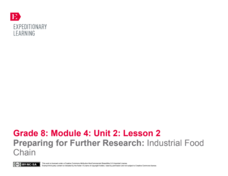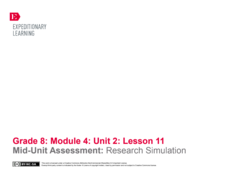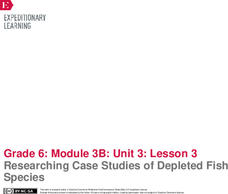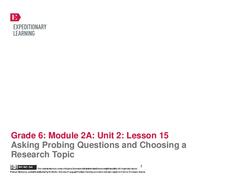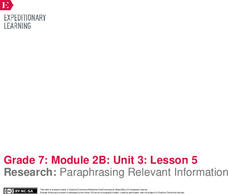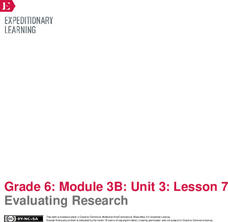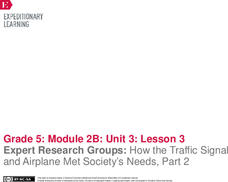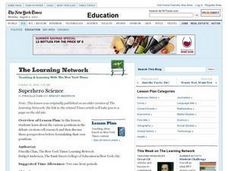Curated OER
Careers in science and careers that support scientific research
Examine some of the occupations which relate to science. Work in small groups of four. Group A is given a copy of a daily television guide to highlight all the television programs that have a science or mathematics focus. Group B is...
EngageNY
Further Research: Industrial Food Chain
Scholars extend their research of the food chain that Michael Pollan discusses in The Omnivore's Dilemma. They determine additional consequences of the food chain and add them to their Cascading Consequences charts. Additionally, pupils...
EngageNY
Preparing for Further Research: Industrial Food Chain
Using an informative resource, pupils discover how to write research questions that are focused, answerable, and relevant. Scholars evaluate resources about the industrial food chain from Michael Pollan's The Omnivore's Dilemma and then...
EngageNY
Using Search Terms for Further Research: Industrial Organic Food Chain
Class members conduct independent research to continue examining the consequences of the industrial organic food chain from Michael Pollan's The Omnivore's Dilemma. Pupils learn about source credibility and effective search terms, then...
EngageNY
Mid-Unit Assessment: Research Simulation
As part of a mid-unit assessment, scholars complete a research simulation about food deserts to mimic the research process. Afterward, they engage in a think-pair-share to discuss what they've learned throughout the unit.
Children’s Hospital of Philadelphia
Animal Research and Vaccines
Animals save lives. In small groups pupils research the role of animals in the development of vaccines. Each team investigates one disease to find out how the vaccine was developed and how animals played a role n the research. Groups...
EngageNY
Researching Information about Sustainable Fishing
Go fish! Scholars continue using their research skills to find factual information to use in their consumer brochures about overfishing. They work in triads to research information about sustainable fishing practices and share their...
EngageNY
Researching Case Studies of Depleted Fish Species
There's something fishy going on in the ocean. Using the resource, scholars engage in a jigsaw activity, researching a case study of a depleted fish species. After completing their research, each triad partners with another group to...
EngageNY
Analyzing How Rainforest Scientists Communicate Their Research (Pages 39–42)
How do you say that? Learners read pages 39-42 of The Most Beautiful
Roof in the World to analyze how the rainforest scientists communicate their research. They record their ideas in a KWL chart and then work in groups to explain...
EngageNY
Research Skills, Part 2: Natural Resource Development and How It Modifies the Physical Environment
Name your source. Scholars receive research folders with articles of information about natural resources. They use the sources to conduct research to answer questions about how Canada's environment meets the needs of the people and how...
EngageNY
Asking Probing Questions and Choosing a Research Topic
Begin the writing journey of an evidence-based essay detailing a rule to live by with various activities to familiarize learners with the topic and jump-start brainstorming. First, pupils take part in an in-depth review and discussion of...
EngageNY
Research: Paraphrasing Relevant Information
Young writers practice paraphrasing information from Truth in Advertising? They keep an eye out for examples of false advertising as they read, recording ideas and information in their researcher's notebook along the way.
EngageNY
Deepening Your Research: The Effect of Advertising on Gender Roles
Let's get back on the road! Scholars continue using their research roadmaps to explore the role of gender while reading Cover Girl Culture. The teacher guides readers through the text as they underline specific sentences. Learners then...
EngageNY
Forming a Research-Based Claim: Comparing Cascading Consequences
It's time to weigh the risks and benefits of screen time! Pupils work in triads to identify the strongest positive and negative consequences from their Cascading Consequences chart. Next, using the chart and their researcher's notebooks,...
EngageNY
Forming a Research-Based Claim: Cascading Consequences Charts
Life is all about choices and consequences. Using a Cascading Consequences chart, scholars create a visual map of the effects of a particular choice or action related to water management. With their researcher's notebooks and copies of...
EngageNY
Researching Facts
How did the 1906 San Francisco earthquake and fire affect the city's inhabitants? Scholars embark on a quest to discover the answer as they work in small groups to research articles about the event. They finish by completing a jigsaw...
EngageNY
Mid-Unit 3 Assessment Part 1: Researching the Destruction Caused by the 1906 San Francisco Earthquake and Fires
How do you interpret that? Scholars work on their mid-unit assessments by interpreting resources pertaining to the 1906 San
Francisco Earthquake and Fires. Readers use the text in their research folders and complete graphic organizers,...
EngageNY
Researching Information about Overfishing
Imagine a world without Nemo and Dory. Using the resource, pupils engage in a jigsaw activity, working in triads to research information about overfishing. They watch a video about overfishing, complete a graphic organizer, read relevant...
EngageNY
Evaluating Research
Calling all archaeologists! Scholars dig through their research about overfishing, searching for the best information to include in their consumer guides. Next, pupils engage in a pair-share activity to discuss their findings with a...
EngageNY
Expert Research Groups: How the Traffic Signal and Airplane Met Society’s Needs, Part 2
Ready, set, act! Using the fun resource, pupils patriciate in a vocabulary charades activity to practice key terms from the unit. Next, scholars work in expert research groups to read an article about the invention of the traffic signal...
EngageNY
Introducing New Athletes to Research: Althea Gibson and Roberto Clemente
Let's take a walk! Scholars participate in a gallery walk to view images and text about athletes Althea Gibson and Roberto Clemente. After summarizing the information they've learned, pupils choose which athlete they are interested in...
K20 LEARN
Unlocking Answers: Keys to Great Research
Successful searches for information require more than just a device with Google access. Young researchers learn how to use keywords and hashtags, as well as how to evaluate sources and how to paraphrase without plagiarizing in a fun...
Curated OER
Superhero Science
Young scientist explore the various positions in the debate on stem cell research and then discuss these perspectives before formulating their own positions. They must research the topic and beliefs that others have. They will also look...
Curated OER
Information Shuffle
Gather some information, print it onto sentence strips, and then have your class physically shuffle the cards to better understand the importance of organizational patterns in writing. Middle school learners examine information for a...
Other popular searches
- Research Tools
- Research Projects
- Research Skills
- Author Research
- Internet Research
- Environment Research Projects
- Country Report
- Research Paper Outline
- Computer Research
- Research Papers
- Research Paper Lesson Plans
- Animal Research




